I witnessed my first forest fire. I saw the world that's coming for us.
One family's tragedy and loss on a changing planet.
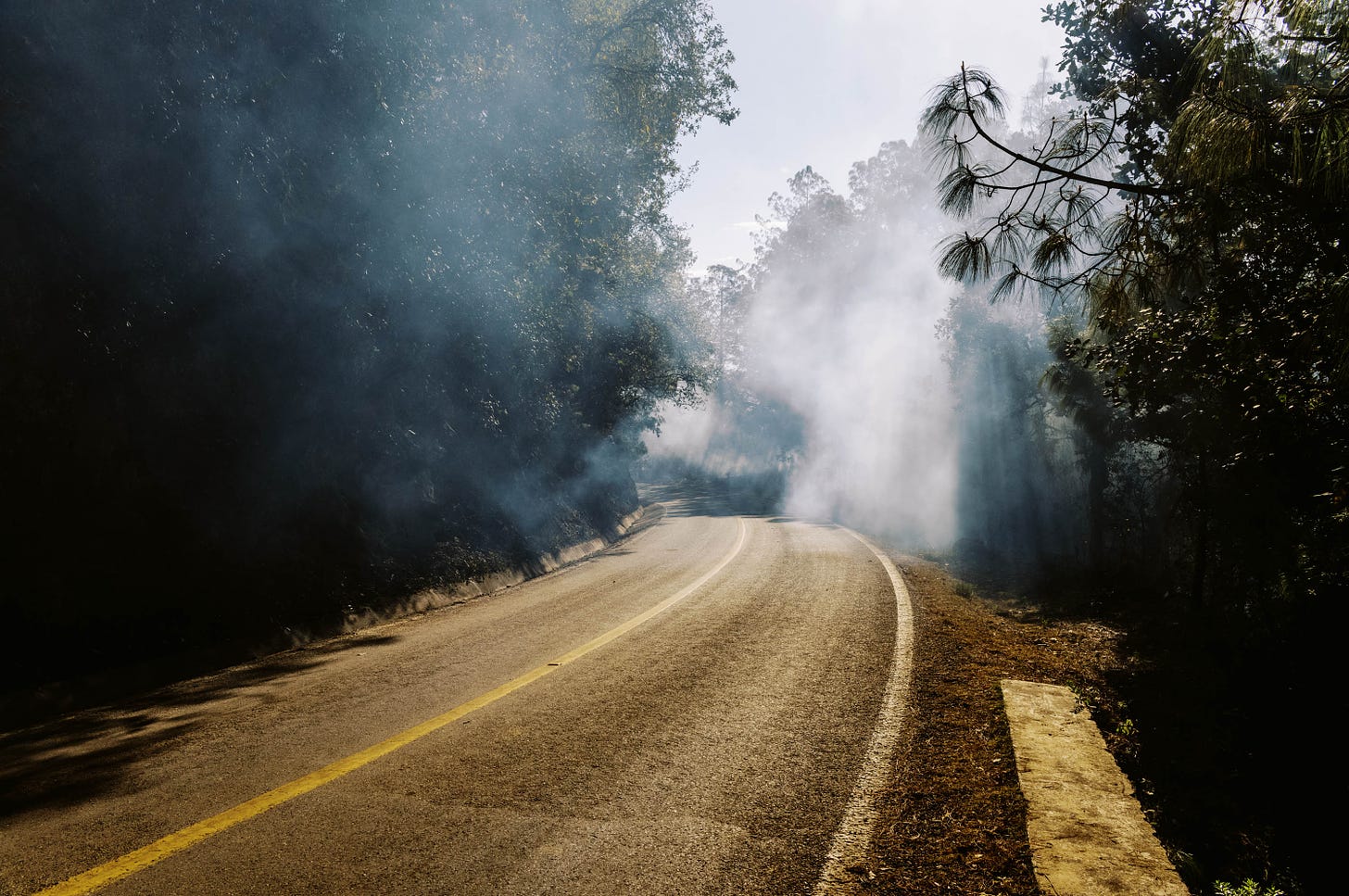
The fire started somewhere just below La Cumbre, a town whose name translates as “The Summit.” La Cumbre marks the spot where Highway 175, the sole road leading from Oaxaca City through the mountains of the Sierra Norte to Veracruz, culminates its vertiginous ascent out of the Oaxacan valley and barrels deep into the high-altitude, frigid pines.
The highway is hair-raising: no guardrails; thousand-foot drops; two lanes barely big enough for pint-sized Oaxacan cars, let alone the vans and buses and trucks that routinely traverse it; brief stretches where it is just possible to pass a slow-chugging logging truck at top speed.
We were not particularly worried about the fire. We heard about it from a friend while visiting a village much further into the mountains. It had apparently leapt across Highway 175 and shut down all traffic there. While it was extremely unusual for a fire to close down the highway, it seemed like something odd and temporary.
We drove back to Guelatao after sunset, eating oranges. The sky was so clear that not only was the moon’s pearly waxing crescent visible, but the whole dark disk, a perfect circle in the lavender dusk.
When we got to Ixtlán, the village just a few miles above Jorge’s, we hit a wall of traffic.
“Uh-oh,” Jorge said. The highway, it was immediately clear, was still closed. Vans, buses, taxis, and cars were backed up and waiting, many for hours and hours. We managed to eke around them and ask the policeman manning the barricade if we could continue on just to Guelatao. They let us through.
That’s when we first smelled the smoke. I remembered the Canadian wildfires that descended on Pittsburgh last summer: whole days Elena, Jorge, and I spent in our local bookstore, reading, as our AQI ticked up to 150 and then 200 and then 300 and the sky turned orange.
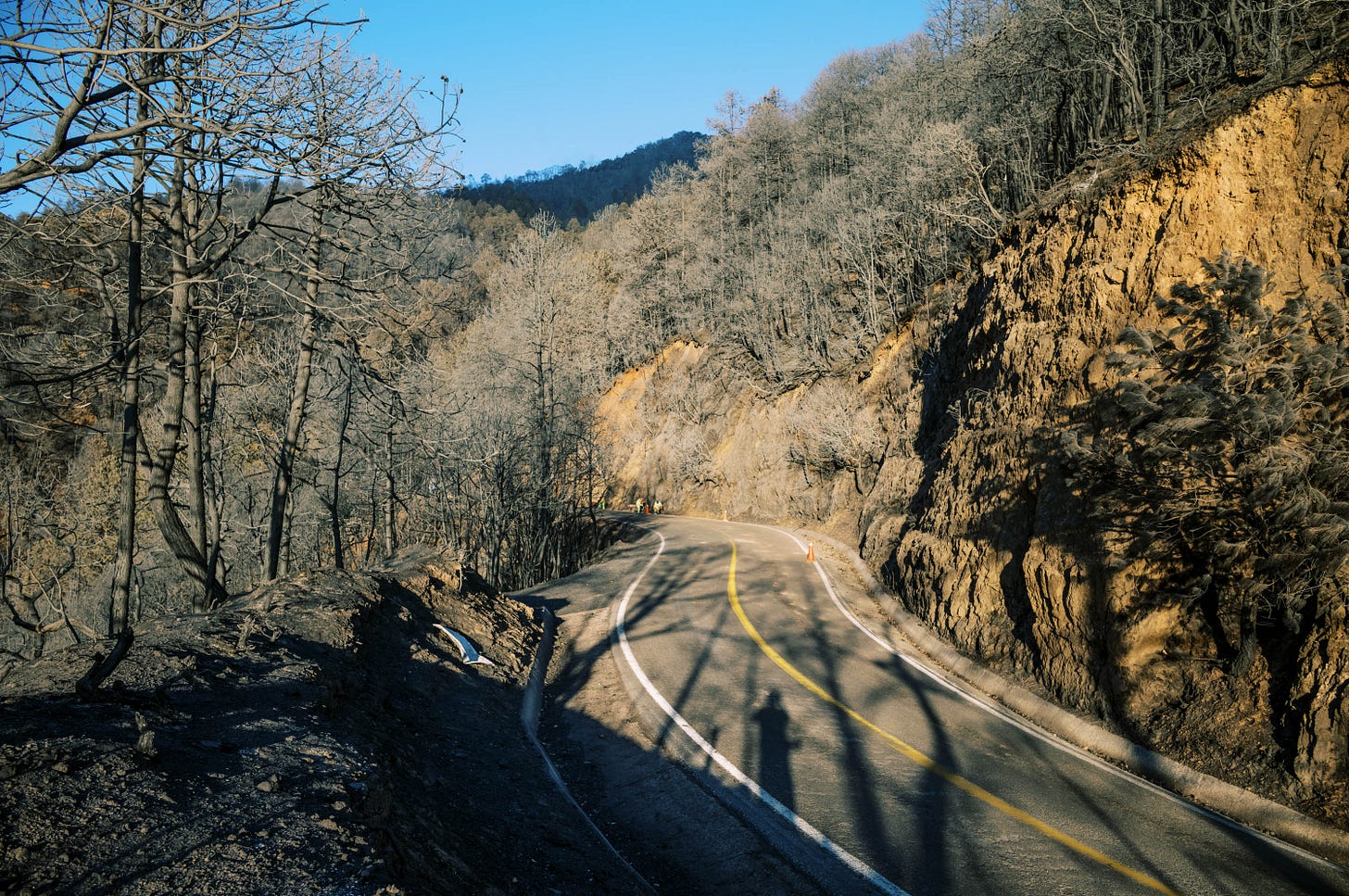
By the time we reached Jorge’s sister’s house and discovered the laundry we’d hung now strewn across the patio, Elena’s sandals launched twenty feet from where we’d left them, we knew it was serious. We texted Jorge’s family. His brother, some fifteen miles closer to the fire, was in the process of carrying enormous pots of food down the mountainside to feed the thousand volunteer firefighters holding off the blaze with pickaxes and shovels.
His sister had been driving back to Oaxaca City and come within a few bends in the road of the flames; she and her family turned back and wound four hours through alternate dirt roads to finally get home. Another sister, living in Guelatao, told us the sky had turned gray and rained ash all afternoon.
We closed all the windows to the house. Told Jorge’s brother to update us if conditions worsened. Slept, each of us trying not to think too much about what would happen if that fire swept some thirty miles down the road, across these mountainsides parched by six-plus months of drought and an epic water shortage, and if somehow that single road out of town was inaccessible, as it was in Lahaina, Maui.
We woke up to feathered clouds and clear air. Another day. Coffee, running, boiled eggs. We headed back towards the city, planning to stop en route to try and talk to people who’d witnessed the fire.
Just past La Cumbre, we drove up a dirt road and then hiked a few hundred meters – tentatively following a roaming herd of cows – to a radio antennae, where we found a group of village men who’d been watching these slopes nonstop for the past twenty-four hours. They looked exhausted. A single, elderly nurse sat with them, drinking a can of apple juice, on hand to tend to injuries. They were part of a kilometers-long human perimeter of volunteers along the mountaintop, watching. We watched, too.
Standing on that tawny mountaintop looking out over the sea of pines, then the blue-gold Oaxacan valley far below, plumes of smoke drifting over it all, I knew that the world I had known and grown up in was irrevocably changed. It is something you know in your bones, not intellectually, not as part of a passionate discussion or idea or meme. It’s real, felt.
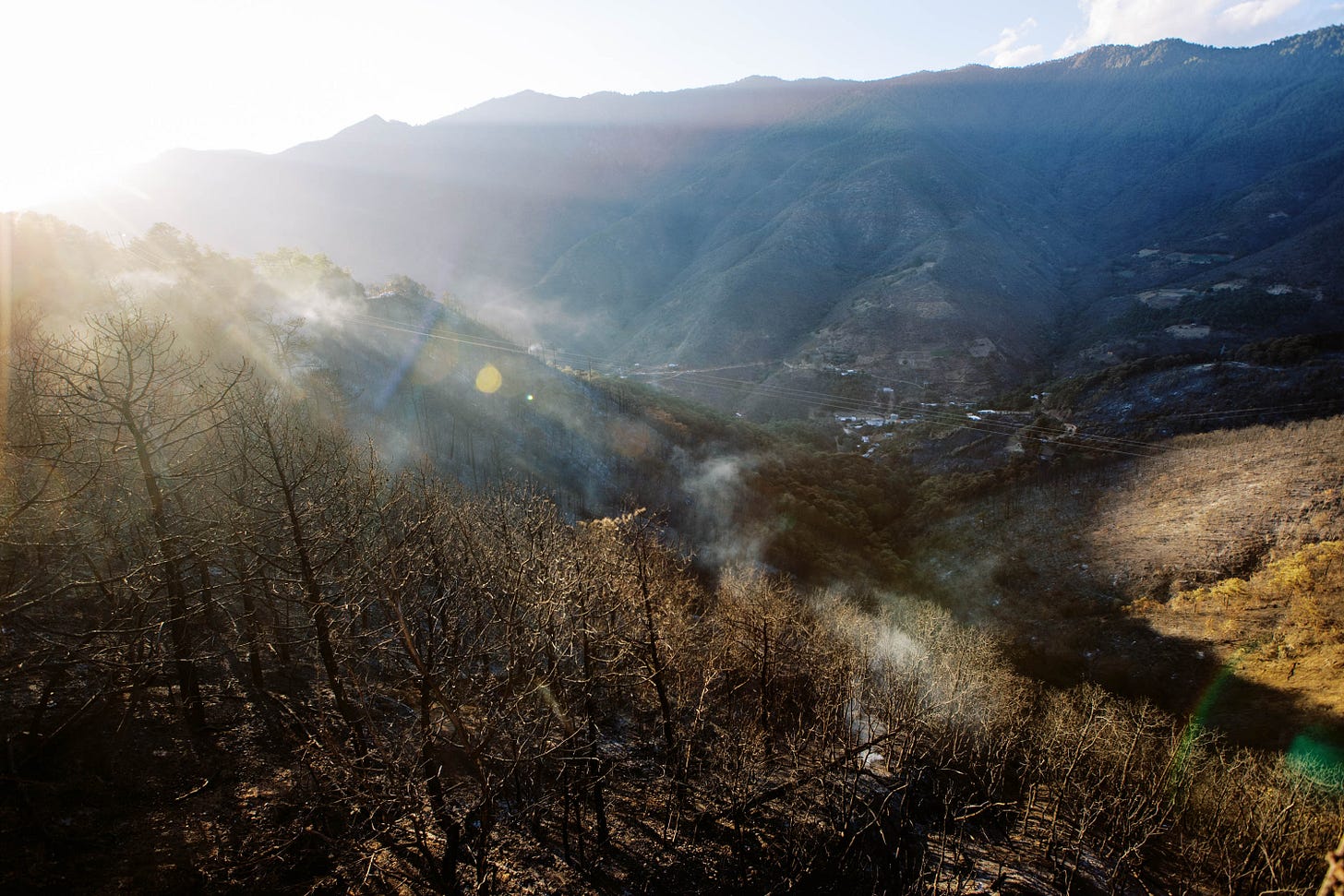
There in Oaxaca City were all the tourists eating 2000-peso five-course dinners with imported Canadian duck, and paying $1500 for AirBnBs that twenty years ago would have rented for $200 to Oaxacan families, and there were the pipas bringing water where there was no water and the wall-to-wall traffic and the planes leaving every hour on the hour.
And here was the fire, and I knew as much as I can know anything that it is coming for us. These two things – the luxury of life under coal and its delusions, and the fire –are one and the same. And for as much as any of us may think we are protected or not think at all, it’s coming.
Here was my daughter with her arm around me, staring at her future. Never, every villager I talked to told me, had they ever seen a fire like this. Fires, yes. Occasionally, they’d flare up a section of mountain and a volunteer group of villagers would put them out.
But this – a spark that became a blaze and then leapt the highway and soared out of control – never. Jorge and I have been living and traveling in Oaxaca for twenty years. We have never encountered a fire like this; not even, for that matter, a smaller fire. They happened, but were so minor they never would have made the news, much less shut down the highway.
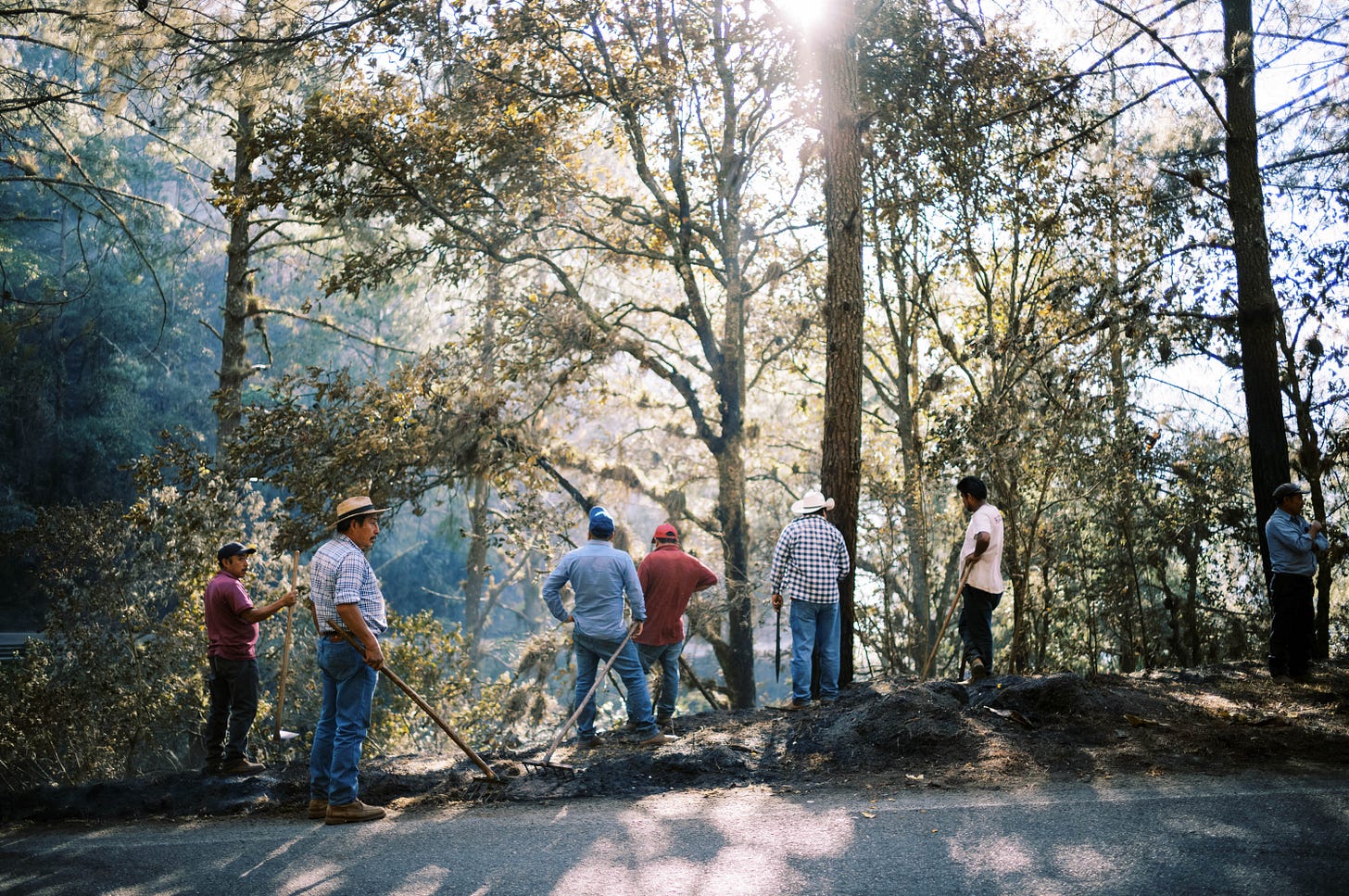
We continued on down the mountain. The destruction, intimated in La Cumbre only by gray plumes, became more and more visible. Charred, smoking roadsides. Alien swaths of irradiated forest like hair turned gray overnight. Men in N-95s, leftover from the pandemic, scooping heaps of steaming ash from roadside ditches. Villagers everywhere on the sides of the highway with pickaxes and shovels, waiting to quelch any flames that might re-emerge.
And finally, on a dusty pullout some ten miles below La Cumbre, la Señora Natalia Espinoza Bautista.
We pulled over to take pictures of smoking ash. But when we looked down, Jorge saw an elderly woman crying. She was squat, with long gray hair, a polyester patterned shirt and pants, and the black plastic sandals we used to call “jellies” when I was growing up, worn by so many rural women here. Her house was squat in the middle of a mountainside of charred, smoking rubble. We scrabbled fifty or so feet down the hillside and called to her, wondering if she’d be willing to talk to us. She squinted up through her glasses – who are you? She asked. We’re journalists, we said. We want to tell your story.
“Pase,” she said. Come in.
I helped Elena down a rough vertical slope, past sharp pieces of discarded tin. We followed the woman beside her house – a series of bare, dark adobe rooms topped with tin – until we came to where the house stopped, where it had been burned to the ground by the blaze. House, house, house, and then no house. A heap of rubble. There, she told us her story.
It was around 2 pm when she’d noticed the smoke. She mentioned this to her husband, who had been recently confined to a wheelchair after having the bottom part of his left leg amputated.
“Capaz que nos va a llegar,” she said. It might get to us. As a precaution, she went to get her husband’s wheelchair, and by the time she’d fetched it, less than five minutes later, she heard the sound of her neighbor’s gas tank exploding. “Ya viene la lumbre!” she shouted. The fire is coming!
She and her eleven-year-old granddaughter maneuvered her husband into his wheelchair. The house sits more than a hundred feet below the road, and the only way to get to the latter is via torturous, uneven mountainside with no clear path. The eleven-year-old granddaughter, named Natalia for her grandmother, dragged her grandfather’s wheelchair uphill.
“I was dizzy,” she told me. She wore secondhand U.S. clothes, the same plastic jellies as her grandmother. She would not look me in the eye. “I almost fainted. I don’t know how I did it.”
Her grandmother, 74 years old, wept as they struggled uphill. Her grandfather, 87 years old, thought they would die. The slope was so steep and scrabbly and the effort so intense that young Natalia’s shoes came off in the dirt. Leave them, her grandmother said, go without them!
Eleven-year-old Natalia dragged that wheelchair uphill all the way to the road, barefoot, and by the grace of God, a truck – evacuating villagers – passed just a moment later. Get in, the men shouted. The fire is coming! The men loaded them in the truck, and as they were pulling away up the mountain, they saw the blaze roar uphill and consume their home.
“If it weren’t for this girl,” the senior Natalia kept repeating, “we would have died.” The younger Natalia would not look at us. Scuffed her shoe in the ash. The older Natalia began to cry. Wiping her eyes beneath her glasses. Overcome. “We would have died if not for her,” she said. She shook in her thin polyester shirt.
“They gave us sweaters. Shoes,” she said. “We have no water. All of our hoses bringing water burned down. We have no light.” Her son, who is deaf and mute, grew flowers for a living. The slopes all around and below the house had been covered in deluxe, snowball-sized, white lilies of the nile. All those flowers had burnt. The peach and avocado trees whose fruit she sold: black husks. Only a few rooms of the house had miraculously survived. Everything she lived from, all around, had perished.
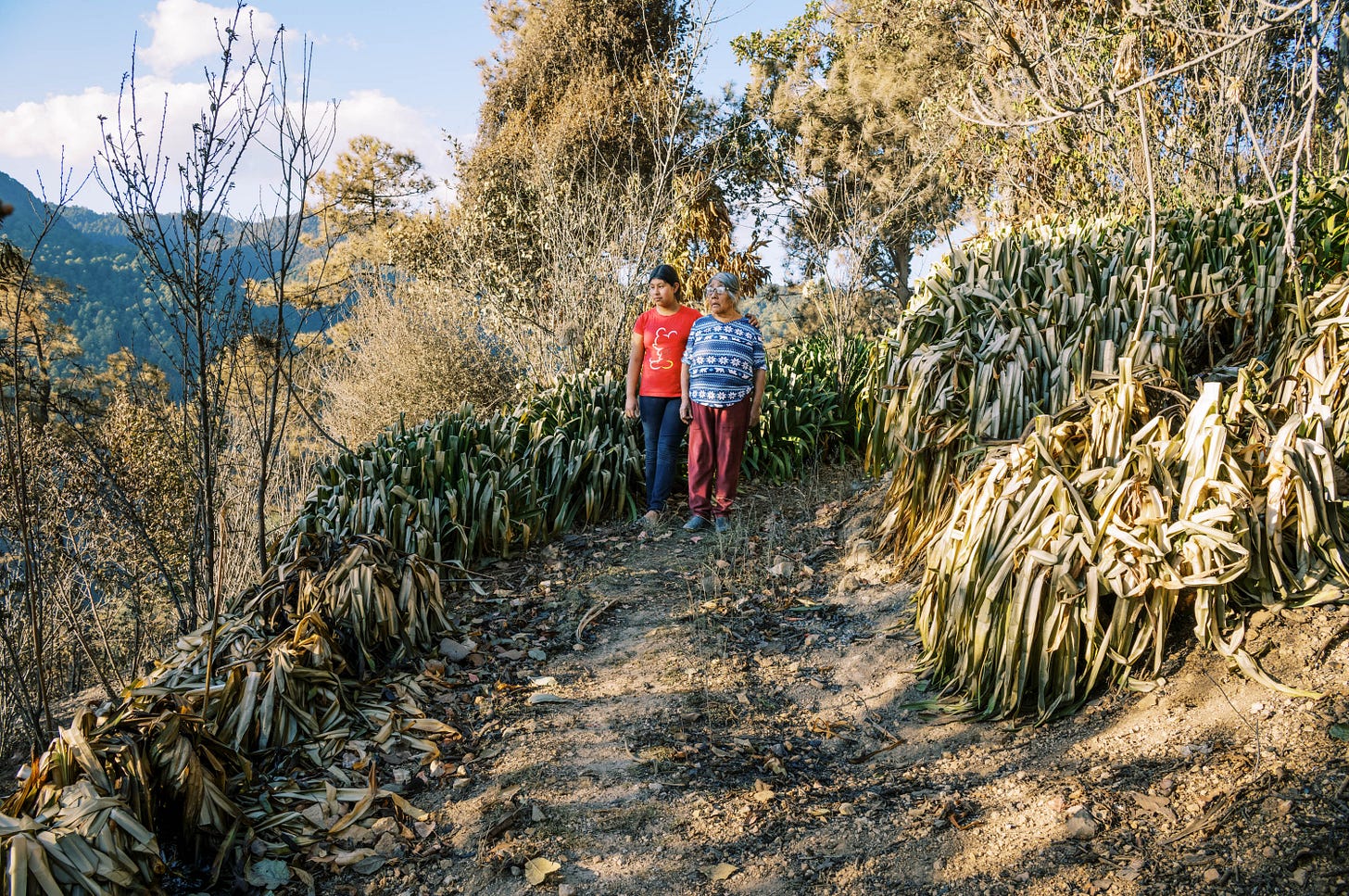
The leaves of the plumeria tree we stood under were crisp as burnt paper and a dark gray; her chickens, her dogs, had burned to death. Dead, black chickens in the field of dead, black flowers.
We stood there, Elena, Jorge, and I, watching as she wiped her eyes, watching as she shook, shocked in this charred hillside. Never, she said, never had she seen an incendio like this. Tears seared the corners of eyes and my throat constricted and I kept telling myself no, no, you owe it to her to keep it together! Keep it together! And then I wondered if that was actually what I owed her: stoicism, objectivity, showing up here with my rental car and my $30 sun hat and my Patagonia fleece and why, because I happened to be born in the United States? Did I owe her dry eyes? Or did I owe her weeping? I did not know.
It has been so long, readers, since I have been in the world, since I have remembered that the teeny tiny sliver of comfortable Pittsburgh I live in represents almost nothing of the human experience on this planet, that I did not know. I didn’t want to scare Elena. I didn’t want to burden Natalia. So I just said, es muy triste. It’s very sad.
Everything around us – the trees, the children’s drawings taped to the walls, the surviving dog pawing the barren hillside – was covered in ash. As we walked back beside the house, la señora Natalia introduced us to her husband. He sat in his wheelchair in a door frame. He greeted us all heartily, shaking our hands. He and Natalia have been married sixty years, as of January 4th. She stroked his head. He thanked us for coming.
“El aire era fuertisma,” grandmother Natalia said. The wind was so strong. “Y el calor era demasiado.” And the heat was too much.
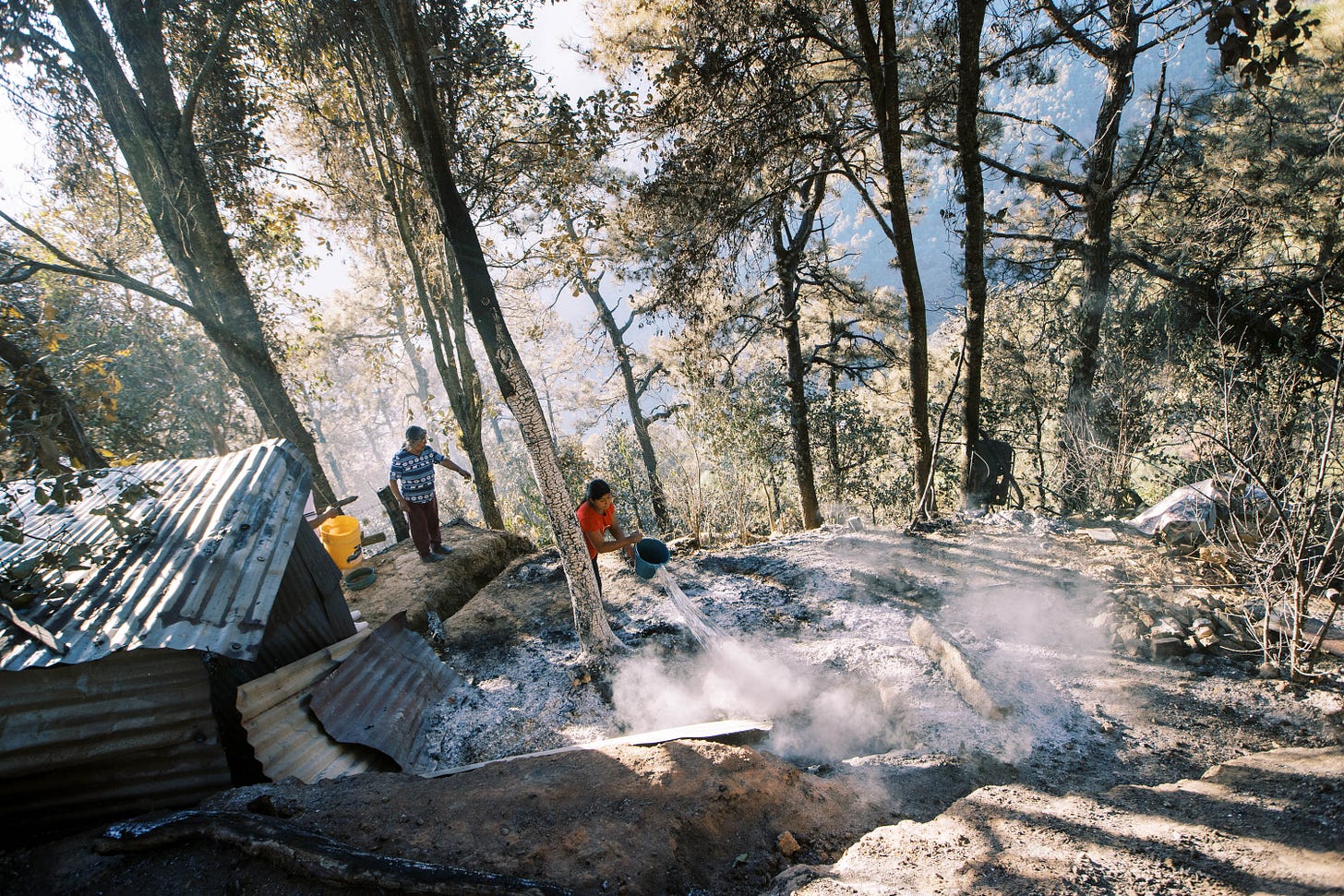
The luxury many U.S. Americans take for granted has long been paid for by poorer people, and people from countries in the global south. Now, with the changing climate, they will pay the most extreme price, but we will all pay. This is our planet. I have driven this highway and hiked in these mountains for two decades. I bring my child here to breathe this air, feel these trees, and know these people who feed us and embrace us with immense generosity even as they see their sons, daughters, friends, partners leave for a treacherous journey to our own – often hateful, often cruel – country.
The older I get, the more I understand that even if we think we are “safe” or removed from the suffering of those so much less fortunate than us, it affects us. Deeply. It affects us morally, karmically, spiritually, economically, and personally. What the poorest of us suffer is what all of us suffer, in ways we may not recognize or may deny, but that live within us and our societies in all of their delusion and excess.
“Humans,” Elena says as we wait in the car for Jorge to finish photographing, the ashen husks of dead pines all around us. “This is all the fault of stupid humans.” I can’t disagree. But many, many humans are not stupid at all, but wonderful.
The men in the truck, local villagers, who came for Señora Natalia and her granddaughter and her husband, gave them sweaters and water and soup. The fire was put out by thousands of local villagers working together with only the simplest tools – no water, as there is barely any water for local usage, much less the quantities needed to extinguish a fire –and using their bare hands. They stayed up all night long and into the next day. People from villages hours away in the mountains or in the valley of Oaxaca – so many of them very poor themselves – made sandwiches and stews and brought sodas and waters and oranges and blankets to the firefighters and the victims of the fire.
Mucha gente ayudan, everyone told us: so many people help.
I was reminded of Rebecca Solnit’s work Hope in the Dark: how in disaster we can also find the very best of humanity, like my husband’s brother and sister-in-law carrying fifty-pound pots of food down a mountainside, shrugging when we asked why they did it. They needed food, they said. People help.
“So many tamales!” Jorge’s brother told us. “Who knows where all those tamales came from?”
"How did they get them down into the forest to firefighters?” I asked.
“Brute force,” Jorge’s brother said. What humans can achieve when we want to. When we are motivated by hope, by community. If only we could start now, before the very first spark.
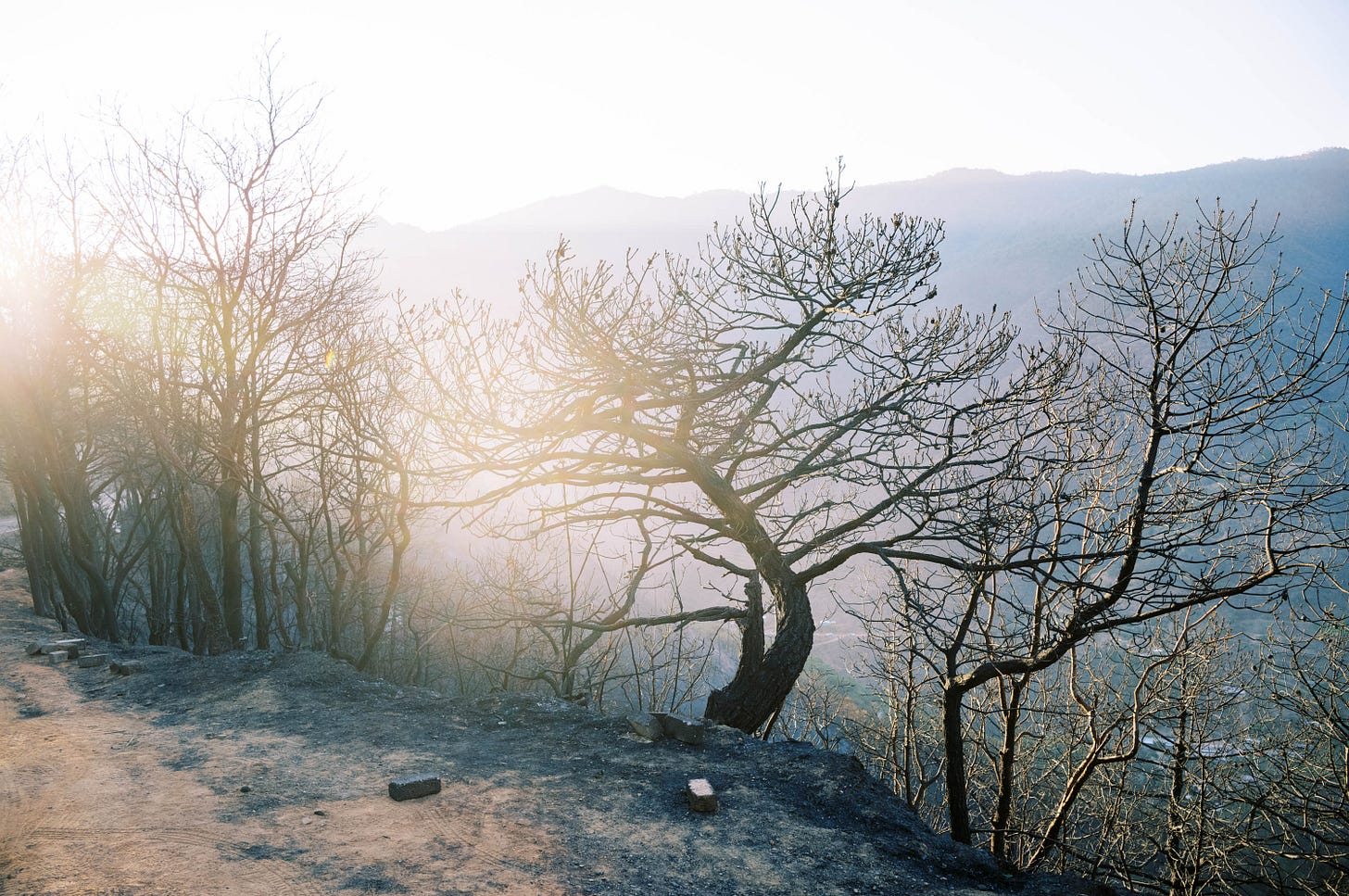
Jorge and I are collecting donations for Natalia’s family. If you’d like to contribute to Jorge’s PayPal, we will take the money to Natalia later this week and post videos and photos to share with you.
Thank you so much for reading, and I invite you to take a moment to value all that you have right now, and to pray in whatever way is meaningful for you for those who are suffering, recognizing that the distance between us is so much less than we often imagine.
Love to you.




Just donated a little bit. This is so sad. Thank you for sharing.
Just donated, very willingly, the money from the yoga class I just taught.
Beautifully written. Keep it!